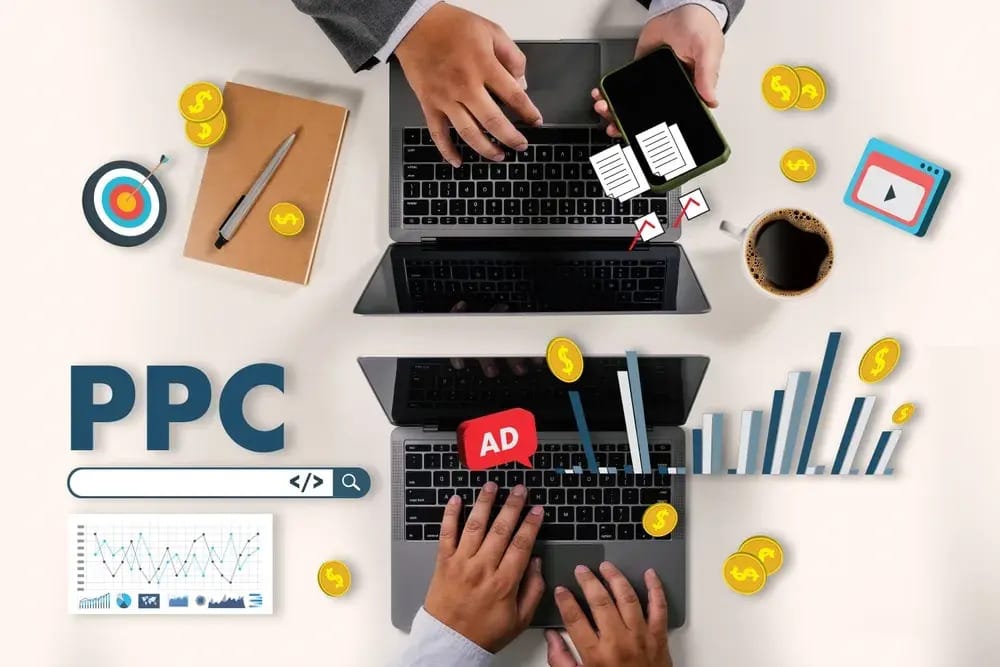Every strategy I build is tested on my own sites first. Working with me means proven SEO that’s already delivering real results.
Businesses today face a crowded digital world. Having a website is no longer enough—brands need ways to get noticed by the right people at the right time. One of the fastest ways to do this is through pay-per-click advertising, often called PPC. A PPC agency specializes in creating and managing these campaigns so businesses can reach new customers quickly and effectively.

This guide explains what a PPC agency does, the benefits of working with one, the services they provide, and how to choose the right partner. Whether you run a small shop or manage a large company, understanding PPC can help you decide if this strategy is the right fit for your goals.
What Is PPC?
PPC stands for pay-per-click. It’s a form of online advertising where businesses pay only when someone clicks on their ad. The most common platforms include Google Ads, Bing Ads, Facebook Ads, and LinkedIn Ads.
When you search on Google and see a sponsored result at the top, that’s PPC in action. Instead of waiting for organic rankings, PPC allows businesses to show up immediately for specific searches or target audiences.
A pay per click agency specializes in designing these campaigns so that businesses get the most out of their budget. Unlike traditional paid advertising, where impressions matter most, PPC is all about driving measurable actions. Every click can be tracked, making it easier to measure results and calculate return on ad spend (ROAS). This clarity is one of the reasons why PPC is one of the most powerful forms of digital advertising.
Strong campaign management involves more than just setting up ads. A PPC manager oversees campaign optimization, performance tracking, and landing page improvements to make sure clicks turn into sales or leads. Social media platforms like Facebook and Instagram also play a growing role, allowing pay per click advertising to target audiences based on interests, behaviors, and demographics.
Agencies use data driven strategies to improve results over time. They run A/B tests, review performance reports, and refine targeting so campaigns can deliver results consistently. The best agencies also share case studies and have a proven track record that shows how they’ve helped clients grow.
For businesses, choosing a top PPC agency is not just about quick wins. Long term success comes from ongoing campaign optimization and performance tracking. With the right partner, pay per click advertising becomes a predictable, scalable way to attract customers and build revenue.
What Does a PPC Agency Do?
A PPC agency is a company that manages these advertising campaigns for businesses. Their main job is to design, launch, and optimize ads that deliver the highest return on investment.
Key responsibilities include:
Researching keywords to target the right searches
Writing ad copy that grabs attention and drives clicks
Designing landing pages that convert visitors into leads or sales
Managing bids and budgets so money is spent wisely
Tracking performance with detailed reports
Testing campaigns to see what works best
Instead of guessing, businesses rely on agencies for expertise and data-driven strategies.
Benefits of Working With a PPC Agency
Immediate Visibility
Unlike SEO, which takes months to show results, PPC puts your business in front of potential customers right away. If you launch a campaign today, your ads can start showing within hours.
Expertise and Experience
Running PPC campaigns may sound simple, but there’s a lot of complexity in bidding, targeting, and optimization. A PPC agency brings years of experience and avoids costly mistakes.
Cost Control
Agencies monitor campaigns closely to prevent wasted spending. They make sure every dollar goes toward reaching the right audience.
Higher ROI
Because agencies test and refine campaigns, they often achieve higher conversion rates and better returns compared to do-it-yourself efforts.
Access to Tools
Professional PPC agencies use advanced software for keyword research, competitor analysis, and performance tracking—tools that many businesses don’t have on their own.
Core Services Offered by PPC Agencies
Keyword Research
Just like SEO, PPC relies on choosing the right keywords. Agencies identify high-intent search terms that bring in valuable traffic, not just clicks.
Campaign Setup
Agencies design campaigns tailored to business goals. This includes ad groups, keyword targeting, and bidding strategies.
Even a well-crafted website needs the right visibility to succeed, so don’t overlook search engine positioning when working on your SEO. Understanding how to climb Google’s rankings is essential for marketers and agency owners who want their content seen, trusted, and acted upon. Our readers come to us to learn actionable strategies, stay ahead of SEO trends, and turn traffic into real results.

Ad Copywriting
Strong ads need clear, persuasive language. Agencies write ad copy that attracts clicks while staying within platform guidelines.
Landing Page Optimization
Clicks only matter if they lead to results. Agencies create or improve landing pages to increase conversions, whether that means sales, sign-ups, or inquiries.
Bid Management
PPC platforms run on auctions. Agencies monitor bids in real-time, ensuring clients don’t overspend while staying competitive.
Performance Tracking and Reporting
Agencies provide regular reports with metrics such as cost per click (CPC), click-through rate (CTR), and return on ad spend (ROAS). This transparency helps businesses see what’s working.
A/B Testing
To improve results, agencies test different versions of ads, headlines, and landing pages. This data-driven approach leads to constant improvement.
Popular PPC Platforms
Google Ads
The largest PPC platform in the world. Ads appear on Google search results, partner sites, and YouTube.
Bing Ads
While smaller than Google, Bing still has millions of users, particularly in certain demographics.
Facebook Ads
Ideal for targeting specific audiences based on interests, behaviors, and demographics.
Instagram Ads
Strong for visual storytelling and brand awareness.
LinkedIn Ads
Best for B2B companies looking to reach professionals by industry, job title, or company size.
Display Networks
Banner ads that appear across a wide range of websites to increase brand visibility.
Why PPC and SEO Work Best Together
PPC and SEO are often seen as separate strategies, but they complement each other. SEO builds long-term visibility, while PPC delivers immediate traffic. Running both together provides coverage on multiple fronts. For example, if your business ranks organically for “affordable accounting services” but also runs a PPC ad for the same keyword, you double your chances of attracting clicks.
Choosing the Right PPC Agency
Factors to Consider
Experience: Does the agency have case studies in your industry?
Transparency: Do they provide clear reports and explain spending?
Customization: Are strategies tailored to your business or are they one-size-fits-all?
Communication: Can you reach them easily with questions?
Certifications: Google Partner or Meta Business certifications are signs of credibility.
Red Flags
Promises of “guaranteed results”
Lack of clear reporting
Agencies that focus only on clicks without tracking conversions
Costs of Hiring a PPC Agency
Agencies usually charge in one of three ways:
Percentage of ad spend (often 10–20%)
Flat monthly fee
Performance-based fees tied to results
The right model depends on budget, goals, and the size of the campaign. While costs vary, the return on investment often makes it worthwhile.
Measuring Success in PPC
The effectiveness of a PPC campaign is measured using metrics such as:
CTR (Click-Through Rate): Percentage of people who clicked the ad after seeing it
CPC (Cost Per Click): How much each click costs
Conversion Rate: Percentage of visitors who completed a desired action
ROAS (Return on Ad Spend): Revenue earned compared to ad spend
Impression Share: How often your ads appear compared to competitors
A good PPC agency tracks these closely and adjusts campaigns to improve results over time.
Case Example: Small Business Growth Through PPC
Consider a local plumbing company struggling to find new customers. They hire a PPC agency that sets up targeted Google Ads for “emergency plumber near me” and “24-hour plumbing service.”
Within weeks, calls increase by 50 percent. The agency fine-tunes the budget to focus on the highest-converting keywords. Within six months, the business sees a strong return on investment and consistent growth in new clients.
Future of PPC Agencies
The world of PPC continues to evolve. Some key trends include:
Artificial Intelligence: Platforms use AI to automate bidding and targeting.
Voice Search Ads: As voice assistants grow, PPC will adapt to spoken queries.
Video Ads: YouTube and TikTok campaigns are becoming central strategies.
Personalization: Ads tailored to individual user behavior are more effective.
Integration: PPC will work even more closely with SEO, email, and content marketing for a full digital strategy.
Agencies that embrace these trends will remain valuable partners for businesses.
Conclusion
A PPC agency helps businesses grow by creating and managing pay-per-click campaigns that bring immediate results. From keyword research to ad copywriting, bid management, and performance tracking, agencies handle the details so businesses can focus on serving customers.
For companies looking to increase visibility, generate leads, or boost sales quickly, PPC offers one of the fastest paths to success. Partnering with the right agency ensures that every dollar spent is an investment in measurable growth.
Have a quick question? Contact me directly and let’s talk through your SEO needs.
